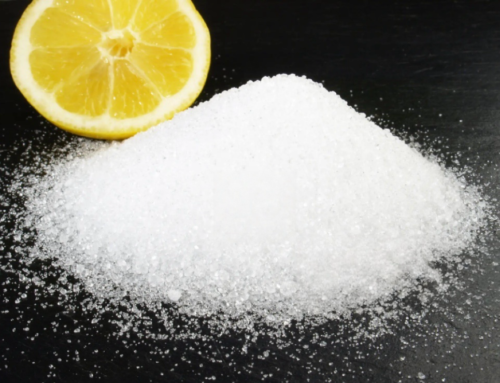Tribasic potassium citrate, also known as potassium citrate tribasic or tripotassium citrate monohydrate, is a chemical compound with the molecular formula K3C6H5O7·H2O. Here are some specifications of tribasic potassium citrate:
Chemical Formula: K3C6H5O7·H2O
Molar Mass: Approximately 324.41 g/mol
Appearance: It typically occurs as a white, crystalline powder or granules.
Solubility: Tribasic potassium citrate is soluble in water.
pH: It has an alkaline pH.
Potassium Content: It is a good source of potassium, with approximately 36% potassium by weight.
Food Additives
Tribasic potassium citrate is commonly used as a food additive and has been approved for use by regulatory agencies such as the U.S. Food and Drug Administration (FDA) and the European Food Safety Authority (EFSA). As a food additive, it serves several functions:
 Acidity Regulator: Tribasic potassium citrate acts as an acidity regulator in food and beverages, helping to control and adjust the pH levels. It can be used to increase or decrease the acidity, depending on the desired effect.
Acidity Regulator: Tribasic potassium citrate acts as an acidity regulator in food and beverages, helping to control and adjust the pH levels. It can be used to increase or decrease the acidity, depending on the desired effect.
Flavor Enhancer: It can enhance the flavor of certain foods and beverages, providing a tart or sour taste.
Buffering Agent: Tribasic potassium citrate is a buffering agent, which means it helps maintain the stability and pH balance of processed foods and beverages. It prevents significant changes in acidity that can occur during production, storage, or processing.
Antioxidant: Potassium citrate, including tribasic potassium citrate, can function as an antioxidant in certain food products. It helps inhibit oxidation and prolong the shelf life of the food by preventing the deterioration caused by exposure to oxygen.
Medical Application
Kidney Stone Prevention: Tribasic potassium citrate helps prevent the formation of certain types of kidney stones by increasing the urinary pH and reducing the concentration of stone-forming substances like calcium oxalate and uric acid. By creating a more alkaline environment, it inhibits the crystallization and growth of kidney stones.
Urinary Tract Infection Prevention: By alkalinizing the urine, tribasic potassium citrate can help prevent the recurrence of urinary tract infections (UTIs). Bacteria find it more difficult to grow and thrive in an alkaline environment, reducing the risk of UTIs.
Acid-Base Balance: Tribasic potassium citrate is used to manage metabolic acidosis, a condition characterized by excessive acidity in the body. It works by neutralizing excess acid and restoring the balance of acid and base in the blood.
Potassium Supplementation: Tribasic potassium citrate is a source of potassium. It provides supplemental potassium to individuals who may have low potassium levels due to various factors such as dietary deficiencies, certain medical conditions, or medications that deplete potassium.
Industrial Applications
Metal Cleaning and Surface Treatment: Tribasic potassium citrate can be used as a component in metal cleaning formulations and surface treatment solutions. It helps remove rust, scale, and stains from metal surfaces and can act as a chelating agent to bind and remove metal ions.
Detergents and Cleaning Products: Tribasic potassium citrate can be utilized in certain detergents and cleaning products. It can help enhance the cleaning efficiency by acting as a chelating agent, sequestering metal ions that can interfere with cleaning processes, and reducing water hardness.
Water Treatment: In some cases, tribasic potassium citrate can be employed in water treatment processes. It can aid in stabilizing pH levels, controlling scaling and corrosion, and sequestering metal ions in water systems.
Textile and Dyeing Industry: Tribasic potassium citrate may find applications in the textile and dyeing industry. It can be used as a buffering agent, helping to control the pH during the dyeing process and improving the dye’s color intensity and stability.
In conclusion, tribasic potassium citrate is a versatile compound with a range of applications in various industries. Primarily known for its roles in pharmaceuticals and food additives, it serves as a valuable component in medications, aiding in kidney stone prevention, urinary tract infection management, and acid-base balance. As a food additive, it acts as an acidity regulator, flavor enhancer, and buffering agent, contributing to the taste, stability, and pH control of processed foods and beverages.
While its industrial applications are more limited, tribasic potassium citrate can be found in metal cleaning and surface treatment formulations, detergents, water treatment processes, and even in the textile and dyeing industry. Its properties as a chelating agent, pH stabilizer, and metal ion sequestering agent make it useful in these industrial contexts.
Overall, tribasic potassium citrate demonstrates its versatility and importance in various fields, contributing to human health, enhancing food quality, and assisting in industrial processes. Its widespread applications highlight the compound’s value and the diverse benefits it brings to different sectors.




